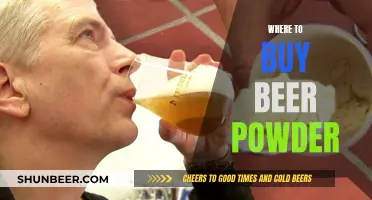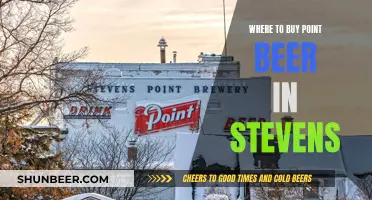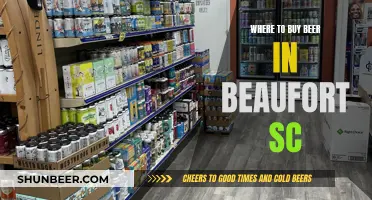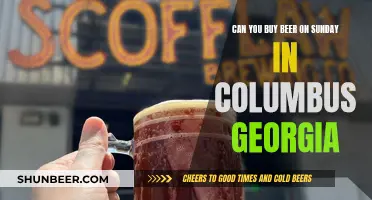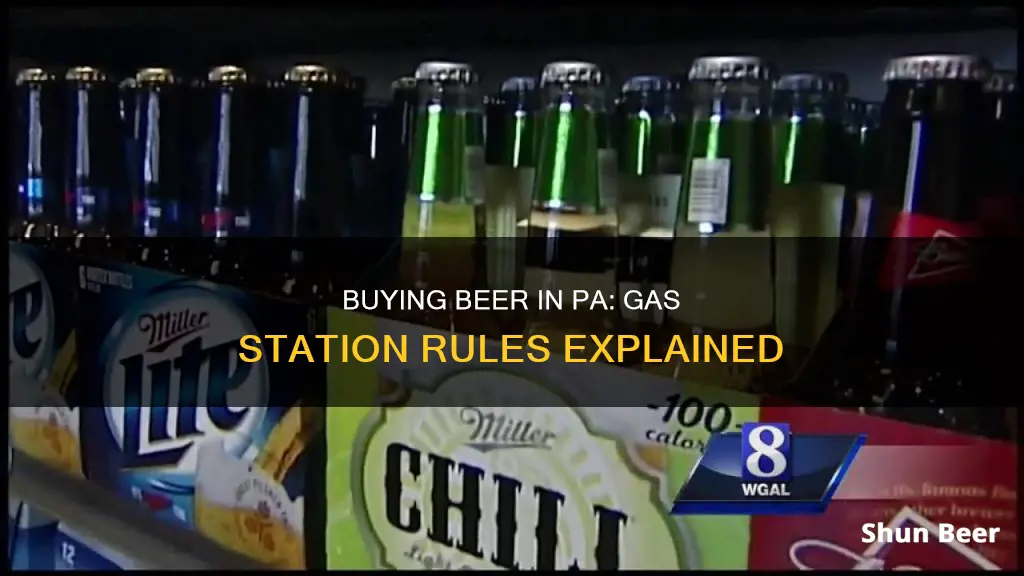
Pennsylvania's alcohol laws are considered some of the strictest in the United States, and the state's complex regulations can be traced back to the Prohibition era and the stance of Gifford Pinchot, who served as governor from 1923 to 1935. While the state's liquor laws have recently loosened, buying alcohol in Pennsylvania can still be confusing, and beer, wine, or liquor cannot be bought to drink at home all in the same place. So, can you buy beer at a gas station in the state?
| Characteristics | Values |
|---|---|
| Can you buy beer at a gas station in PA? | No |
| Can you buy ready-to-drink cocktails at a gas station in PA? | Yes |
| Who signed the bipartisan legislation allowing the sale of ready-to-drink cocktails at gas stations? | Governor Josh Shapiro |
| When did the legislation come into effect? | September 16th |
| What is the ABV range of the ready-to-drink cocktails? | 0.5% to 12.5% |
| What is the maximum quantity of ready-to-drink cocktails that can be sold per sale? | 192 ounces |
| What is the cost of the permit application fee? | $2,500 |
| What is the annual renewal fee for the permit? | 2% of the cost of ready-to-drink cocktails purchased annually |
What You'll Learn
- Beer can be purchased from a distributor or in limited quantities at supermarkets
- Beverage distributors can sell beer in any amount, while supermarkets have quantity restrictions
- Beer distributors can sell kegs, cases, 12-packs, six-packs, single bottles, and growlers
- Beer and wine can be delivered to your home or business from breweries and delivery services
- Beer and wine can be purchased from a restaurant, bar, or licensed retailer

Beer can be purchased from a distributor or in limited quantities at supermarkets
The Pennsylvania Liquor Control Board (PLCB) was created to license establishments, set serving hours, and regulate prices. The PLCB has recently begun allowing the sale of ready-to-drink cocktails (RTDC) at gas stations and grocery stores, thanks to bipartisan legislation signed by Governor Josh Shapiro. This legislation created a new RTDC permit, which allows the sale of pre-mixed spirits-based RTDC ranging from 0.5% to 12.5% ABV in containers up to 16 ounces for off-premises consumption. The PLCB has already received over 1,500 applications for this permit and has started issuing them to qualifying establishments.
While beer can be purchased from distributors in any amount, supermarkets have quantity restrictions. Distributors are permitted to sell beer and malt liquor but not wine or hard liquor. People under 21 may enter most beverage distributors without an adult because they also sell non-alcoholic drinks and snacks. The hours of operation for beer distributors are typically similar to those of wine and spirits stores, with the state restricting sales before 9 am on Sundays.
Many supermarkets in Pennsylvania have restaurants attached, where they are permitted to sell small quantities of beer and wine. These attached restaurants must have a defined separation from the rest of the supermarket, a separate cashier, and seating for at least 30 patrons. Some supermarkets have also begun selling alcohol within the main supermarket building, but only under very specific conditions.
Buying Beer Tomorrow: What You Need to Know
You may want to see also

Beverage distributors can sell beer in any amount, while supermarkets have quantity restrictions
The state of Pennsylvania has some of the strictest alcohol regulations in the United States. These laws can be traced back to the Prohibition era and the stance of Gifford Pinchot, who served as governor from 1923 to 1935. Pinchot believed that state control was the best way to prevent corruption in the alcohol industry. As a result, the Pennsylvania Liquor Control Board was created to license establishments, regulate prices, and set serving hours.
One peculiarity of Pennsylvania's alcohol laws is the distinction between beverage distributors and supermarkets when it comes to beer sales. Beverage distributors, which also sell soft drinks, are permitted to sell beer and malt liquor in any amount, but not wine or hard liquor. On the other hand, supermarkets have quantity restrictions on beer sales and can only sell limited amounts, typically up to 192 fluid ounces (equivalent to 12 16-ounce cans) per transaction. This means that customers who wish to purchase larger quantities of beer will need to make multiple transactions or visit a beverage distributor.
Beverage distributors have fewer restrictions compared to supermarkets and can sell kegs, cases, and 12-packs of beer. Since 2016, they have also been allowed to sell six-packs, single bottles, and growlers. However, it is important to note that beer purchased from a distributor is for "off-premise consumption," meaning it cannot be consumed on the premises. Supermarkets, on the other hand, can sell beer for on-site or off-site consumption, but they are limited to the quantity they can sell per transaction.
The hours of operation for beer distributors are typically similar to those of Wine and Spirits stores and other retail establishments. On Sundays, a special license is required to sell beer, and sales before 9 am are not permitted. While state law permits late-night beer distributors, local authorities can impose additional restrictions, and stores typically close before 10 pm.
In summary, Pennsylvania's alcohol laws differentiate between beverage distributors and supermarkets in terms of beer sales. Distributors can sell beer in any quantity, while supermarkets are restricted to selling limited amounts per transaction. These laws are a reflection of the state's historical stance on alcohol regulation and continue to shape the way alcohol is purchased and consumed in Pennsylvania today.
Down Syndrome and Beer: Legal Drinking Age?
You may want to see also

Beer distributors can sell kegs, cases, 12-packs, six-packs, single bottles, and growlers
Beer distributors in Pennsylvania have been able to sell beer in any amount since 2016. This includes kegs, cases, 12-packs, six-packs, single bottles, and growlers. However, it is important to note that all beer purchases from distributors are for “off-premise consumption”. This means that you cannot buy beer from a distributor and drink it on their premises.
Pennsylvania's alcohol laws are considered some of the strictest in the United States and can be traced back to the Prohibition era. Gifford Pinchot, who served as governor from 1923 to 1935, was a teetotaler and maintained a tough stance on alcohol control even after Prohibition was repealed during his second term. Pinchot established the Pennsylvania Liquor Control Board (PLCB) to license establishments, set serving hours, and regulate prices.
The PLCB operates on a quota system, with the current quota being one license per 3,000 county inhabitants. There are several types of liquor licenses available, including retail liquor licenses and retail dispenser licenses. Retail liquor licenses allow for the sale of liquor, wine, malt, and brewed beverages, while retail dispenser licenses are limited to brewed and malt beverages only.
In addition to beer distributors, bottle shops, grocery and convenience stores, bars, and licensed breweries can also sell beer, although the amount they can sell depends on the type of license they hold. Bottle shops, grocery and convenience stores, bars, and other licensed establishments can sell up to 192 fluid ounces of beer per transaction, which is equivalent to 12 16-ounce cans. Licensed breweries can sell beer for on-site or off-site consumption, as well as products from other Pennsylvania-licensed producers for on-site consumption.
Pennsylvania's alcohol laws have recently been relaxed, making it easier for people to purchase alcohol. For example, in 2016, Governor Tom Wolf signed Acts 39 and 166 into law, loosening restrictions on beer and wine sales and shipping and expanding state store hours. Additionally, as of 2024, Pennsylvania grocery stores and gas stations can sell ready-to-drink cocktails containing spirits, following bipartisan legislation signed by Governor Josh Shapiro.
Best Places to Buy Chimay Beer: A Guide
You may want to see also

Beer and wine can be delivered to your home or business from breweries and delivery services
Beer and wine lovers in Pennsylvania can now enjoy their favourite drinks from the comfort of their homes or offices, thanks to the growing number of breweries and delivery services offering home delivery. Whether you're stocking up for a party, filling up the beer fridge at home, or just trying something new, there's no need to worry about leaving the house.
Beverages2U, for example, offers a wide range of alcoholic and non-alcoholic beverages for delivery across Pennsylvania. With a subscription service and statewide delivery, they make it easy and convenient to get your favourite drinks. You can also find local delivery services like Mobile Liquor Service in Philadelphia, which offers beer, wine, and spirits delivery.
In addition to dedicated delivery services, some supermarkets and convenience stores also offer beer and wine delivery. For instance, several supermarkets, including Acme, Giant/Martin's, and Wegmans, have restaurants attached to their stores where they can sell small quantities of wine and beer. Similarly, convenience store chains such as Royal Farms, Rutter's, Sheetz, Turkey Hill, and Wawa sell beer and wine at select locations.
It's worth noting that Pennsylvania has some of the strictest alcohol regulations in the United States, with a complex history of alcohol laws. While you can now find beer and wine delivery services, each establishment must be licensed, and there are specific rules and restrictions in place for serving hours, quantities, and more.
Kozel Beer: Is It Available in the US Market?
You may want to see also

Beer and wine can be purchased from a restaurant, bar, or licensed retailer
The sale of alcohol in Pennsylvania is regulated by the Pennsylvania Liquor Control Board (PLCB), which was established in 1933 by then-Gov. Gifford Pinchot, a teetotaler. The PLCB issues licenses to establishments, controls serving hours, and regulates prices.
While the laws surrounding alcohol sales in Pennsylvania have recently been relaxed, the state's liquor laws are still considered some of the strictest in the United States.
Beverage distributors (which also sell soft drinks) can sell beer and malt liquor, but not wine or spirits. Most beverage distributors allow people under 21 to enter without an adult because they also sell non-alcoholic products.
In 2024, Governor Josh Shapiro signed bipartisan legislation allowing the sale of ready-to-drink cocktails at grocery stores and gas stations. These RTDCs can contain up to 12.5% alcohol by volume and are available for off-premises consumption. The PLCB has implemented a new permitting process, and hundreds of permits have already been issued to qualifying establishments.
Red Rocker Beer: Where to Buy and Enjoy It
You may want to see also
Frequently asked questions
Yes, as of September 16, 2024, gas stations in Pennsylvania can sell ready-to-drink cocktails.
The ABV limit for ready-to-drink cocktails sold at gas stations in Pennsylvania is 0.5% to 12.5%.
The container size limit is 16 ounces.
Gas stations can sell no more than 192 ounces of ready-to-drink cocktails per transaction.
The permit costs $2,500 with an annual renewal fee of 2% of the cost of ready-to-drink cocktails purchased each year.


